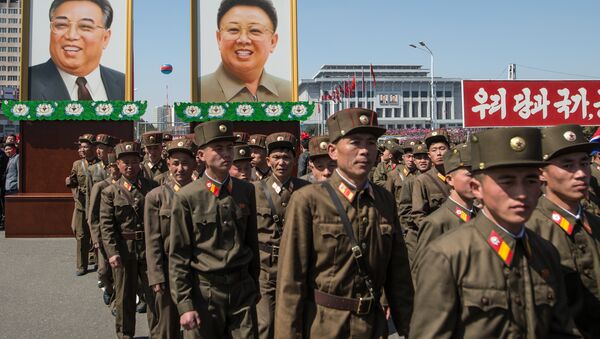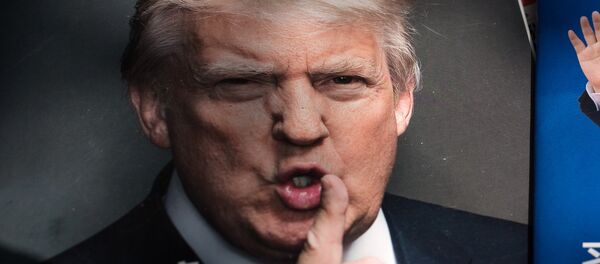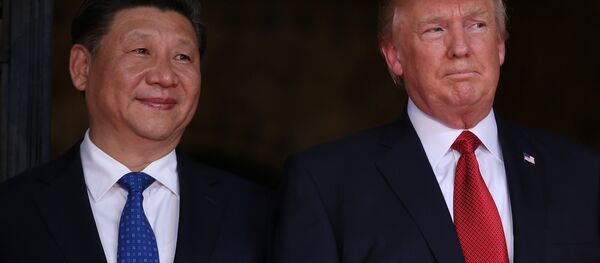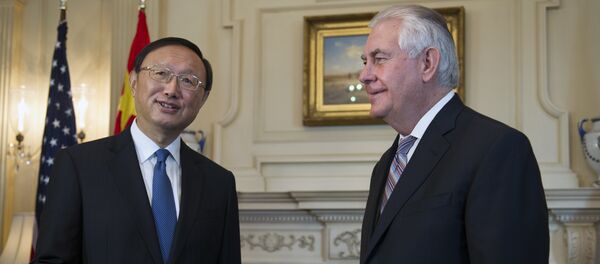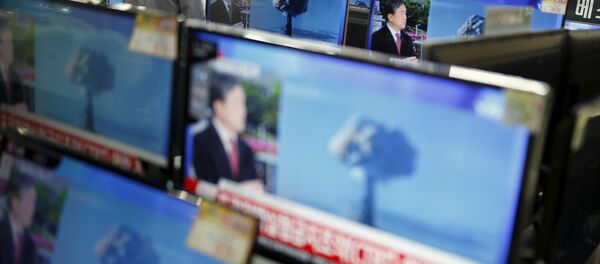MOSCOW (Sputnik), Tommy Yang — US President Donald Trump is unlikely to launch a preemptive strike against North Korea despite his hawkish rhetoric and numerous threats of military actions after apparently convincing China to cooperate on the issue, experts told Sputnik.
Struggling to contain an increasingly aggressive young leader in North Korea, China appeared more willing to work with the Trump administration to deescalate the sharply rising tension on the Korean Peninsula.
In his most recent telephone conversation with the US president on Monday morning, Chinese President Xi Jinping once again expressed his willingness to cooperate on North Korea.
LIMITED OPTIONS FOR CHINA
As China failed to convince the younger Kim to abandon the nuclear arms program in North Korea, Chinese leaders could only resort to economic measures to try to contain its neighbor. Due to heavy economic sanctions from the West, North Korea relies heavily on trade with China to finance its military programs. Even liquid rocket fuel for its missiles is derived from crude oil imports from China.
Following the first meeting with Trump in Florida in early April, Xi appeared to be ready to put on more economic pressure on North Korea. Chinese Foreign Ministry spokesperson Lu Kang confirmed this week that China has stopped "this year’s import of coal produced in North Korea" since February 18. According to NK News, foreign residents in Pyongyang, the North Korean capital, reported an 83% spike in gas prices this week, indicating China may have cut back on its crude oil exports to North Korea.
"It’s difficult to see what kind of impact Beijing’s measures will have on the nuclear program in North Korea… The common consensus is that Kim still needs 1-2 years to build up his arsenal of nuclear weapons." Willy Lam, an expert on Chinese politics at the Chinese University of Hong Kong, said.
"Going forward, both Xi and Trump are willing to cooperate with each other… It’s a give and take situation. For example, Trump has stopped calling China a currency manipulator," he pointed out.
The United States has previously accused China of intentionally undervaluing its currency to keep its export-oriented economy competitive in the global market, with the tendency culminating in Trump’s "currency manipulator" accusations during his election campaign. Trump backed down over labelling China a currency manipulator explicitly saying this was due to the country’s willingness to cooperate over North Korea. By softening his stance on the currency issue with China, Trump looked to be keeping his words on "a trade deal with the US will be far better for [China] if they solve the North Korean problem," as put by the president himself.
TRUMP NOT AS RUTHLESS AS HE SOUNDS
With North Korea continuing to advance its nuclear arms program and conduct missile tests, Trump ratcheted up his rhetoric by vowing to send "an armada" to deter North Korea. But the naval strike group, headed by the USS Carl Vinson supercarrier, was still off the northwest coast of Australia, almost two weeks after Trump’s promise.
After witnessing Trump ordering the launch of 59 Tomahawk missiles against a Syrian military airfield, political analysts worried the unpredictable American president could stage a similar attack against North Korea. But the sheer number of possible casualties in the South Korean capital from North Korea’s retaliation made it impossible for Trump to order such an attack, Lam said.
"Such a strike would require support and approval from South Korea and Japan, who are both important allies for the US in the region. They’re much more vulnerable to counterattacks from North Korea than American territory," the expert explained.
Glass skyscrapers and apartment buildings in Seoul, a metropolitan area populated with 25 million people, are within the range of about 15,000 North Korean artilleries, stationed just about 35 miles away.
"Trump does not dare to launch [such an attack]," Shi Yinhong, a professor of international relations at the Renmin University in Beijing, said, also stating that the South Korean capital would not withstand shelling from the north.
Shi also questioned the effectiveness of Trump’s military actions.
"The result from the attack on Syrian targets showed us that such attacks are useless… Did the Tomahawk missiles weaken Assad’s control over Syria?" he reflected.
Despite the fact that Trump seemed to have taken a much harsher stance against North Korea than former US President Barack Obama’s administration, it is still unlikely for him to strike North Korea in the near future, Shi said.
"There is still room for political solutions to dissolve the tension on the Korean Peninsula," he said.
A military solution would be certain to meet staunch resistance from China and is currently not even necessary for the United States, the expert concluded.

